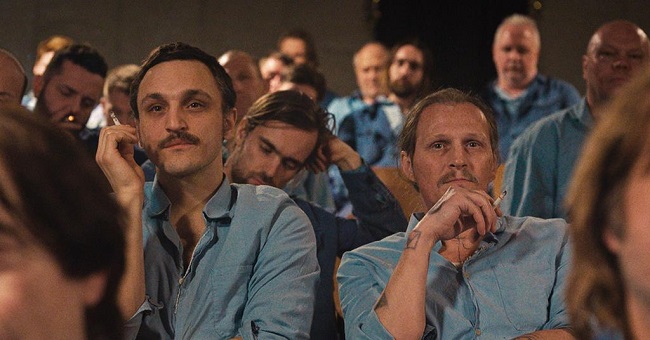Like a late night viewing of the 1969 moon landing on a prison TV in “Great Freedom” (“I thought it would be more exciting,” muses one inmate), seismic change seems less spectacular when charted against the everyday grind of life behind bars in this gripping, tender-hearted prison drama from Austrian director Sebastian Meise.
That includes another watershed moment from the same summer, when West German authorities relaxed Paragraph 175, which had previously led to the imprisonment of men for homosexual behaviour.

‘Great Freedom’ Review
Meise’s film is a beautiful union of personal, political, and sensual storytelling, following the decades leading up to this transition via the eyes of a repeat offender, with the narrative and chronological drift reinforced by another performance of softly piercing vulnerability from Franz Rogowski.
After ten years, Meise finally delivers on the poised promise of his breakthrough fiction movie, the complicated and contentious family drama Still Life, by once again taking a sensitive and compassionate approach to explicit material in his latest film, “Great Freedom.”
The film received the runner-up prize in Un Certain Regard at the Cannes Film Festival, and it has since been taken up for distribution in numerous territories, including North America, by Mubi. It is also expected to have significant additional festival play, particularly in the LGBTQ arena. Overall, it ought to elevate Meise into a more prominent auteur category by the time his next feature film is out.
Meise and Thomas Reider’s beautifully structured script makes years fly by in the blink of an eye by weaving in and out of timelines to show how time moves quickly and slowly at the same time.
There is no doubt that Hans (Rogowski), who serves multiple, shorter sentences as punishment for his wants, views his time in jail very differently from his reoccurring cellmate Viktor (Georg Friedrich), a convicted killer serving a life sentence.
The film begins in 1968, with Hans’ arrival at what seems like the umpteenth time in prison, followed by a Super 8-shot titles montage of men cottaging in a public lavatory, the sexiness of which is cut short by the discovery that it’s police surveillance tape. While Viktor seems amused by his reappearance, Hans’s self-deprecating shrug betrays his tiredness.
Younger Gay Inmate in the Jail Yard
When Hans steps in to defend a younger gay inmate in the jail yard, he is placed in solitary confinement, and his windowless cell serves as a time portal for the audience. It is 1945 now, and Hans, who has survived his time in a Nazi concentration camp, is being ruthlessly taken straight to prison to serve out the remainder of his sentence.
There, he is placed in an uneasy cellmate relationship with Viktor, a man who says he is straight and who has no interest in living with a gay man. The film’s chronology is all over the place, jumping between the two time periods and a portion set in 1957, but we already know that their connection has warmed over time.
Meise carves moments of tactile intimacy out of harsh settings with the help of Crystel Fournier’s outstanding lensing; one of the most pivotal is when Viktor, an amateur tattoo artist, offers to cover over the camp number on Hans’ forearm.
The Two Men will Share Similar Moments of Vulnerability
Through the years, the two men will share similar moments of vulnerability and need as they go through sorrow, addiction, and prison boredom together, but their growing closeness will always be overshadowed by Viktor’s ingrained homophobia. Meise isn’t all that concerned with making pristine moral statements; “Great Freedom” is more about the flawed companions we meet in times of crisis.
Despite the fact that Hans had several sexual encounters while incarcerated, Meise’s film stays firmly a two-hander, and even a romance, as it follows Hans and Viktor’s relationship as it develops from mutual animosity to passive-aggressive acceptance to mutual dependence.
Their evolving feelings for one another are beautifully expressed by the performers without a lot of dialogue. The cast of “Great Freedom” is trusted to convincingly portray the effects of 24 years of wear and tear without the use of artificial ageing cosmetics. Friedrich keeps Viktor’s gruff, calloused demeanour, but his body language becomes more defensive with time; Rogowski’s Hans actually gets tougher over time, albeit his face shows the tiredness of recurrent harassment for doing nothing more than living his life.
Last Words
Even though the horrors he endured in the concentration camp are evident in his cautious outlook on life, they are not addressed in “Great Freedom.” The focus of most research on Paragraph 175, such as the 2000 documentary “Paragraph 175” by Rob Epstein and Jeffrey Friedman, has been on the law’s implementation in Nazi Germany, but Meise aims to show the lasting damage it did in a purportedly more emancipated post-war society.
A caveat to the title is that the law was relaxed in 1969 but was not completely done away with until 1989, therefore the designation is not without its own caveats. In “Great Freedom,” time generally moves forward save for extended periods of inactivity.












